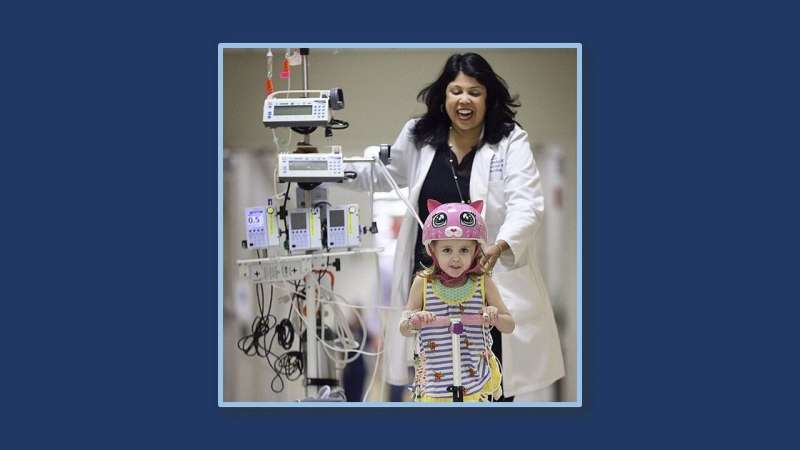Johns Hopkins Children's Center critical care specialist Sapna Kudchadkar, M.D., Ph.D, helps a pediatric intensive care unit (PICU) patient stay mobile to hasten her recovery. A new study shows many children in PICU may not be receiving this valuable care. Credit: Johns Hopkins Medicine
Adult patients in hospital intensive care units (ICUs) are often given rehabilitation therapy and urged to keep mobile from an early point in their hospital stays. This has been shown to improve muscle strength, physical functioning and cognitive health, along with reducing the risk of pressure ulcers ("bed sores"), blood clots and other short-term threats. However, the prevalence or lack of rehabilitation practices for critically ill children in pediatric intensive care units (PICUs) across the nation has been not been solidly researched.
Now, a multicenter study led by researchers at Johns Hopkins Medicine shows that 65% of the PICU patients examined did not get physical or occupational therapy, or adequate opportunities to be mobile, while hospitalized during the study period. Female patients and those with normal physical function prior to illness were the most likely to not receive this important care. The study team also found that 19% of critically ill PICU patients were completely immobile during the same time span.
The researchers reported their findings in the May 2020 issue of the journal Critical Care Medicine.
In the study, known as PARK-PICU (for "Prevalence of Acute Rehab for Kids in the PICU"), researchers gathered data on critically ill children in 82 PICUs in 65 hospitals across the United States. This represents one-third of all PICU beds in the country. There were 1,769 patient days in the PICUs reviewed, with the researchers also evaluating perceived barriers and potential safety events for patient mobility.
"Despite the evidence that early rehabilitative therapy and mobility provide benefits to adults in ICUs, and despite the fact that it is known to be safe and reliable for children, our findings reveal that patients in PICUs are not getting the rehabilitative care they need," says Sapna Kudchadkar, M.D., Ph.D., associate professor of anesthesiology and critical care medicine at the Johns Hopkins University School of Medicine and lead author of the study.
Kudchadkar and her colleagues also found that two-thirds of all children admitted to the PICU for three days or longer are under age 2.
"Pediatric survivors of critical illness commonly experience long-term physical, cognitive and psychological problems, and these issues are compounded by the fact that while children are in the PICU, they are undergoing intensive physical and mental development," she says.
Based on their study findings, the researchers urge hospitals to "systematically design and evaluate PICU rehabilitation interventions for a vulnerable patient population.
More information: Sapna R. Kudchadkar et al, Physical Rehabilitation in Critically Ill Children, Critical Care Medicine (2020). DOI: 10.1097/CCM.0000000000004291
Journal information: Critical Care Medicine
Provided by Johns Hopkins University School of Medicine























